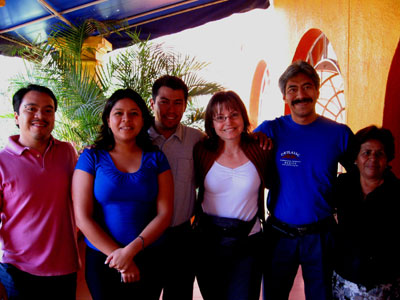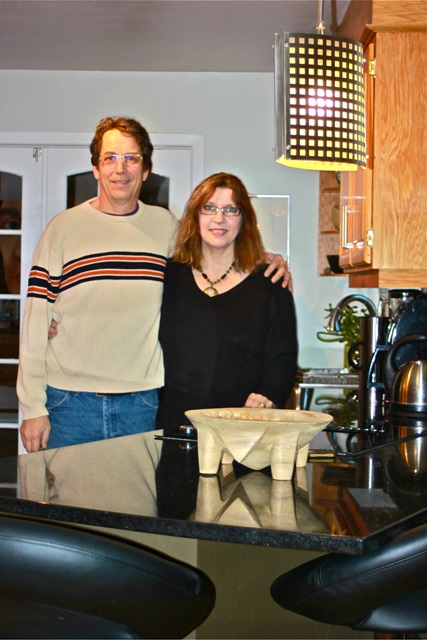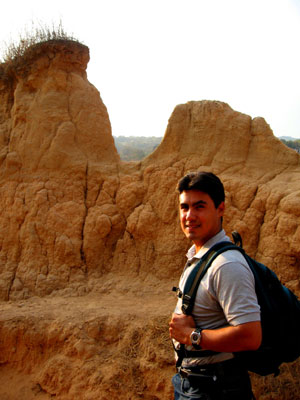My stay in Cuernavaca this past April was filled with many experiences: travel experiences; historic, cultural and culinary explorations; new friendships and , most notably, learning experiences. During my second week I spent several days learning Spanish at the CETLALIC Alternative Language School.
I was in a class with 2 other students with very advanced level knowledge and the three of us worked hard to master the intricate details of the Spanish language. It goes without saying that several days were spent on working with the Spanish subjunctive (an old staple for Spanish language learners).
CETLALIC is an alternative language school and its founder, Jorge Torres, and his employees dedicate themselves to social and political activitism to help bring more justice to Mexican society. During our lectures we heard some interesting information about the Zapatista movement and we also discussed social issues, such as the current shortage of water and the unequal distribution of resources, including water, in Mexican communities.
Jorge Torres has a very strong connection to the Mexican workers movement and has been active for several decades to help bring about social change. Many of CETLALIC’s students come from non-profit organizations or activist groups and in line with his policy of inclusiveness, CETLALIC also welcomes gay and lesbian students and provides gay and lesbian-friendly accommodations with local families.
Here is Jorge Torres and he will tell us about how his strong commitment to social causes came about. He will give us an overview of his special programs directed to groups such as healthcare workers, ministers, and others and he will give us an overview of his 3×3 work-study program. Jorge will tell us how CETLALIC today contributes to making Mexico a juster society.

The team at Cetlalic with Jorge Torres (2nd from the right)
1. Please tell us a bit about yourself and your personal background. How did you get involved in the field of language teaching?
By accident, I was studying my first year in a college and one of my teacher invited me to attend a course for teaching Spanish for foreigners. I took it and with time I really enjoyed teaching my language and my culture.
I am from the lower class, my father worked for almost 20 years in a textile factory belonging to a US firm, and my mother worked for many years as domestic worker. We don´t use “maid” or servant”, this is so offensive.
2. Your father was involved in the Mexican workers’ movement. How did that influence you and your view of the world?
Of course it was a tremendous influence, because of the many meetings they had. They were at home and they talked about the terrible situation of exploitation, low payment and other things. I helped my father and his colleagues to distribute flyers in front of the factory, by the door when the workers were leaving.
That helped me to understand about our reality, about our difficult situation. Especially when he and others were fired, and they held a sit-in (like a strike) in front of the factory, because the owners didn´t want to pay the severance pay that they owed to the employees by law.
3. Please tell us a bit about Mexico, its history and its social, cutural and political background.
Oh, this is such an interesting question but, at the same time, I would need a lot of time to explain this. I could just say that in Mexican history the people at the bottom, el pueblo, the real people always have been used by others, those from the elites, in order to benefit a few of them. The poor people always have been at the forefront of the big struggles (like the Independence war in 1810; or the Mexican Revolution in 1910) and they were being killed. But once the change came through, they didn’t receive what the leaders had promised to them.
The poor people always believe in some leaders and many times they expect a solution to their problems (land, food, education, democracy, liberty, support, and so on).
We are a rich culture, we have more than 3, 500 years of history, we have a beautiful country with a lot of natural resources. We are an optimistic and happy culture, we like to laugh, to dance, to sing. BUT the inequality and the oppression from the different governments has been our big problem. And also some US administrations, sometimes, have been trying to keep us in a situation of underdevelopment. It would take so long to explain why.

Moi with my Spanish teacher Mario (including my certificate)
4. How did Cetlalic come into being and how did has it evolved since 1987?
In 1987, we were a committee in solidarity with the people in El Salvador. In Morelos during the 70´s and the beginning of the 80´s, we had a progressive catholic bishop, Don Sergio Mendez Arceo. And for many years the people in this state, Morelos, especially Cuernavaca, were supporting the refugees from Central America. So we were one of the groups for solidarity.
Because we didn´t have money for our activities or for helping more of the refugees, we decided to become a self-sufficient organization. We decided to become a language school, because there were many languages schools in Cuernavaca. And we believed it was going to be easier to bring in foreigners to study Spanish so they would learn about the Latino-American culture and the reality.
We didn´t know how difficult the recruiting was going to be. We didn´t know anything about marketing.
5. Your school is different from other language schools in that it is an “alternative language school” as it also dedicates itself to social and political activitivism. Please tell us more about that.
CETLALIC was founded in 1987 as an alternative school, integrating intensive study of Spanish language with experiential cultural learning and analysis of current issues with grassroots organizations and others who are actively involved in their society.
CETLALIC is small and our staff is able to attend to the needs of each student. Our goal is to promote dialogue between Mexico and the people of other cultures and, in order to reach that goal, we make the experience of every participant our concern. We welcome all students irrespective of nationality, ethnic origin, race, gender, sexual preference, age, etc.
6. Please tell us about your Spanish language classes, your class facilities, your weekly schedule and your teaching faculty.
Our Spanish language program is demanding, but in a friendly atmosphere. Classes are limited to five students. Every morning, there are three hours of intensive language instruction from 9 to12, followed by a “práctica” session from 12 to 2, in which students participate in round table discussions on a variety of national & international topics. CETLALIC is accredited by the Ministry of Public Education (State of Morelos, Mexico).
We offer small, intensive classes at all levels, year-round, as well as several Special Programs every year, each focused on a particular issue or area of interest, which often include travel in the region.
7. You use a unique method to teach Spanish: the Paulo Freire Method. Please give us an overview of this teaching methodology.
Paulo Freire’s methodology is applied to the teaching of Spanish as a second language and students are expected to contribute their insights and ask the questions necessary for critical analysis. Our teachers are native speakers with professional training and extensive experience.
8. Many of your students stay in homestays. Please describe this accommodation method and its advantages.
Living with a Mexican family is an integral part of our program. It provides a unique experience to learn about the people, their food and their customs, as well as an incomparable opportunity for students to practice and refine their Spanish language abilities. All our families welcome gay/lesbian students. We are also proud to offer gay or lesbian homestay options in which our gay/lesbian students can feel comfortable.
 Our classes were held on this beautiful balcony
Our classes were held on this beautiful balcony




